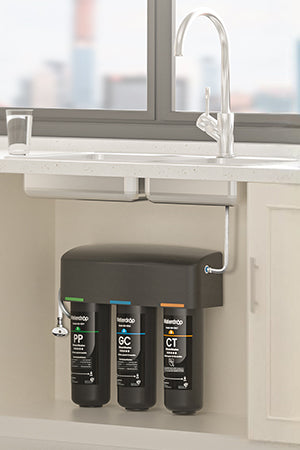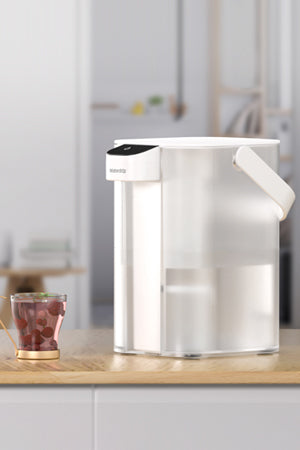Coffee aficionados are well aware of the fact that the quality of the water has much to do with the flavor of the coffee. From espresso to pour-over, even the best coffee beans would be tasting bad when the water is not just right. For coffee enthusiasts in Singapore, the question then lingers: “Is reverse osmosis (RO) water good for coffee?”
In this article, we'll take a closer look at the effects of reverse osmosis water on coffee, the advantages and disadvantages, and how installing a top-notch system like Waterdrop RO filters allows you to make better coffee at home.
What Is Reverse Osmosis Water?
Reverse osmosis is water purification technology where water is pushed through a semipermeable membrane. This procedure gets rid of most of the dissolved solids, minerals, salts, and impurities, leaving very purified water.
RO water comes under the description of “soft water” because the level of
total dissolved solids (TDS) is very negligible, nearly 10-30 ppm. For your information, regular Singaporean tap water contains only 80-150 ppm of TDS. Although RO water is the best drinking and cooking water, the low level of minerals makes coffee extraction and taste suspect.
Why Water Quality Matters for Coffee
Coffee is more than 98% water, so the quality of the water has a direct impact on the flavor and aroma. You should consider the following three things:
Mineral Composition
These minerals actually help bring out the coffee flavor extraction. Not enough minerals (like pure RO water) cause coffee to be weak tasting, and too much cause it to be bitter and over-extracted.
The pH Level
Neutral or weakly acidic water is best suited for coffee-making.
Reverse osmosis water tends to be highly pure and weakly acidic, and this alone can impact the balance of the flavors you experience in your cup.
Chlorine and Other Impurities
Tap water may have chlorine or some chemical substances, which have bad effects on the taste. In contrast, the impurities are eliminated by the reverse osmosis system, so the real flavor of the coffee bean comes through.
Click here to learn more about
Is RO Water 100% Pure?
Pros of Using Reverse Osmosis Water for Coffee
1. Remits Unwanted Impurities
RO water is free of chlorine, sediments, and impurities which hide the inherent taste of coffee beans. That gives you a fresher, better-fragrant cup.
2. Uniform Quality
Since the RO systems strip off most of the dissolved solids, you have the same water quality each time, and this matters a lot for home coffee making. Unpredictable water can cause unpredictable flavor.
3. Best for Espresso Machines
They are scale-sensitive espresso machines. With the use of RO water, the machine avoids the formation of mineral ladders and works well throughout.
Disadvantages of Drinking Coffee Made of Reverse Osmosis Water
However, the water from the RO does come with numerous advantages:
1. Low Mineral Content
Calcium and magnesium are not present in the RO water, and this may decrease the extraction of the flavor, so the coffee tastes somewhat flaccid.
2. Need for Re-mineralization
Certain coffee connoisseurs advise supplementing the minerals of the RO water to achieve the best flavor. This may be accomplished by specific additives for water, mineral cartridges, or by mixing the RO water and filtered kitchen sink water.
3. Possible Expense
High-capacity RO systems involve initial costs and maintenance of the filters. Nevertheless, systems of low waste and high capacity, such as
Waterdrop RO filters , are convenient for household use in Singapore.
How to Brew Coffee with Reverse Osmosis Water
Despite poor-mineral RO water, you are capable of making great coffee by doing the following:
- Adjust Coffee-to-Water Ratio: Use a tiny bit more coffee grounds to make up for the reduced extraction due to soft water.
- Consider Adding Minerals: You may resort to using a mineral cartridge or trace mineral drops to enhance the body and flavour.
- Use Fresh Beans: The clearer the water, the clearer the nuances of the flavor. Employing fresh-roasted, quality-oriented beans guarantees your coffee has the aroma of coffee.
- Keep Your Equipment: RO water does not cause scaling, but your coffee machine does require occasional cleaning to remove bacterial growth.
Is RO Water Smoother Than Tap Water?
Tap water in Singapore is considered, by and large, safe drinking water and complies with
WHO requirements . Nevertheless, it could have chlorine, fluoride, or different content of minerals, influencing the coffee taste.
Using filtered water through the RO system assists in maintaining water quality consistently and eradicating chemical flavors. If properly calibrated, the RO water can yield fresher, better-tasting coffee than ordinary tap water, particularly for espresso and specialty coffee brewing.
People Also Ask
Will RO water make the coffee better?
RO water eliminates contaminants such as chlorine, which may enhance coffee flavor. However, since it’s so soft, reintroducing minerals may help accentuate the extraction of flavor.
Can you use RO water for espresso?
Yes. RO water is best for espresso machines because it avoids scale deposits and maintains even extraction. Traceable minerals may enhance the body and aroma.
How to make the coffee taste better?
You can add trace minerals using mineral cartridges or drops, or blend RO water with filtered tap water. This helps improve flavor extraction and adds body to the coffee.
Is the coffee affected by the drinking water?
Yes. Safe to drink though, chlorine, fluoride, and different mineral composition of drinking water may impact subtly coffee aroma and flavor. RO water use as the base for brewing may yield a cleaner start.
Tips for Singapore Coffee Lovers Using RO Water
Spend Money on a High-End RO System
Waterdrop RO systems are compact, energy-efficient, and yield excellent quality purified water perfect for home brewery.
Modify Your Brewing Technique
Keep the grind size, brew time, and coffee-to-water ratio in mind to adjust flavor extraction to soft RO water.
Experiment with Mineral Content
If you find the water too soft you can add trace minerals to get the perfect balance for your desired coffee style.
Regular Maintenance
RO systems and coffee maker both require frequent replacements and cleaning of the filters so they can perform best.
Final Thoughts
RO water gives you clean, regular, and contaminant-free water, which makes it perfect for espresso, pour-over, and other coffee presentations. Low content of minerals, which may impact body and flavor to some degree. You are able to obtain each and every time a rich, full-bodied, balanced cup by re-mineralizing your RO water or by altering brewing parameters.
For coffee enthusiasts in Singapore, the
Waterdrop RO system makes the perfect solution. It provides ultra-pure water, avoids scaling, and maintains quality consistency — making it easier than ever to have the perfect- brewed-beverage-at-home. If you tackle this the correct way, your morning coffee can be of coffee-shop quality, all from your own kitchen.





































































